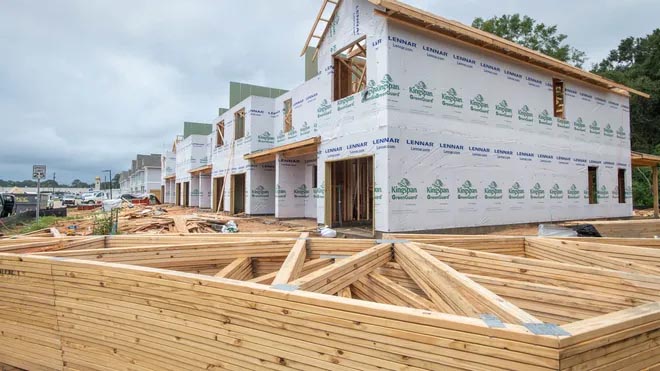By Jordan Meadows
Staff Writer
The 2025 North Carolina Affordable Housing Conference, held Tuesday and Wednesday in Raleigh, brought together housing professionals, advocates, developers, and policymakers from across the state to address the pressing issues impacting affordable housing in North Carolina.
The event kicked off with a keynote address featuring Dr. Jenny Schuetz, Vice President of Infrastructure and Housing at Arnold Ventures. Schuetz, a former senior fellow at Brookings Metro and economist at the Federal Reserve, now leads efforts to reform housing policy to expand supply and affordability nationwide.
In her remarks, Dr. Schuetz emphasized the need to rethink the built environment:
“One is just seizing a wider range of structure types. More than three-quarters of the land in our cities, and even more than in our suburbs, is reserved exclusively for single-family housing. Those are the largest kinds of houses; they take a lot of land, and they're the most expensive kind of structures for people to buy.”
The keynote also touched on the national legislative landscape. Speakers noted that a record number of states are now actively addressing housing through legislation, and that momentum is building at the federal level. Notably, the ROAD to Housing Act (Renewing Opportunity in the American Dream to Housing Act), introduced by Senators Elizabeth Warren (D-MA) and Tim Scott (R-SC), was highlighted as the most significant bipartisan pro-housing supply legislation in decades.
States like California and Texas were referenced as blueprints—both for what to do and what to avoid. While they’ve made strides in reducing regulatory barriers and zoning restrictions to allow more housing to be built, the process in those states has become deeply politicized and contentious, often marked by clashes between developers, advocacy groups, NIMBY (Not In My Backyard) interests, and entrenched political actors.
Joining Dr. Schuetz in the opening session were David Bennett, President of Centrant Community Capital; Samuel Gunter, Executive Director of the NC Housing Coalition; and Scott Farmer, Executive Director of the NC Housing Finance Agency.
Stephanie Watkins-Cruz, Director of Housing Policy at the North Carolina Housing Coalition (NCHC), also played a prominent role at the conference. Since joining NCHC in August 2022, Watkins-Cruz has brought her deep passion for affordable housing, community engagement, and bridging local and state-level strategies. She contributed her policy expertise to several sessions throughout the event, particularly those focused on aligning legislative action with the lived realities of North Carolinians, ensuring that future housing policy remains equitable and responsive.
One of the most anticipated moments of the conference was the panel honoring the 2025 Housing NC Awards winners. Representatives from four award-winning developments shared insights into the challenges they overcame, the creative partnerships they leveraged, and the lessons they learned during their projects. Through a moderated Q&A session, attendees gained valuable perspectives on how these successful models could inform future housing efforts across the state.
Throughout the two-day event, sessions were designed to address both policy and practice. The Annual Developers Workshop served as a critical touchpoint for developers preparing for the 2026 Qualified Allocation Plan (QAP) and the next round of Low-Income Housing Tax Credit (LIHTC) applications. Another session focused on the Community Reinvestment Act (CRA), offering guidance for community-based organizations on how to engage more effectively with banks, understand CRA-related activities, and develop strong partnerships that drive local investment.
Compliance and regulation were also major themes. The session on "Hot Topics in Housing Credit Compliance" was led by team leads from the NC Housing Finance Agency—Randa McCauley, Tanya Clark, and Chelsea Isaksen—who addressed the agency’s implementation of key federal policies while sharing trends and best practices in multifamily housing compliance.
A session on supportive housing addressed the unique needs of North Carolina’s most vulnerable populations, including individuals experiencing homelessness, those with disabilities, and those with substance use disorders. Panelists outlined strategies for emergency, transitional, and permanent supportive housing, covering the entire development process from funding through construction and operations.
The significance of this conference is underscored by current housing trends in North Carolina: nearly half of the state’s renters and 19% of homeowners are cost-burdened, spending over 30% of their income on housing. At the same time, analysis of 62,710 property listings shows North Carolina homes are approximately 20% below national price averages, with the average home price at $519,908.
The housing market is also well-balanced: over one-third of homes are listed under $300,000, creating real opportunity for first-time buyers, while the mid-range and luxury segments remain strong.
This statewide event followed the regional Triangle Affordable Housing Conference held earlier in April 2025. Longstanding institutions like the NC Housing Finance Agency—responsible for financing more than 321,000 homes totaling $34.4 billion—and advocacy organizations like the NC Housing Coalition, which continues to advance critical housing legislation and funding tools, the 2025 Affordable Housing Conference reaffirmed the urgent need for multi-sector collaboration to ensure every North Carolinian has a safe, stable, and affordable home.

